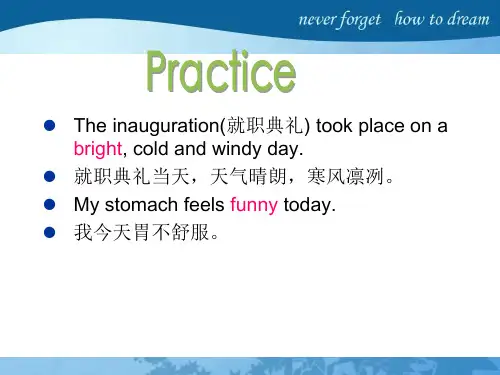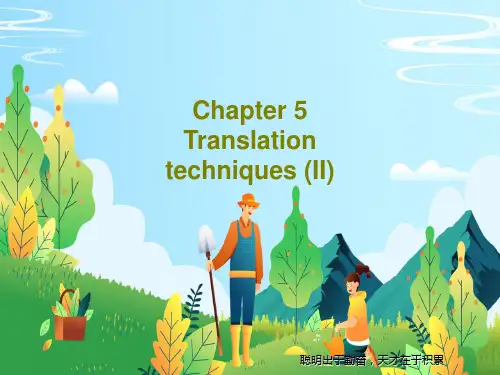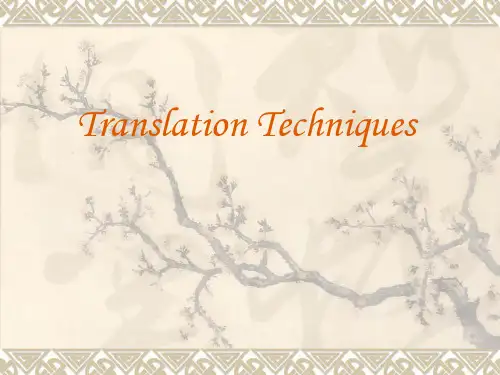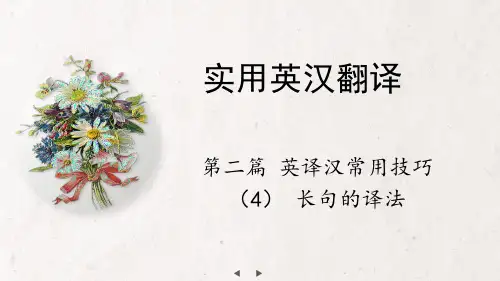英汉互译简明教程-Translation Techniques
翻译课程 第8讲 正说反译和反说正译

翻译课程第8讲正说反译和反说正译广西师范学院《英汉互译(一)》课程教案编号: 15-8 开课单位:外语系授课教研室:翻译写作课程名称:《英汉互译(一)》授课教师:唐旭光教材:《新编英汉互译教程》,授课对象:06级英语专业2、3、5班《英汉互译(一)》第八讲正说反译与反说正译(Conversion Between Positive and Negative Expressions)17. He reminded me of what I should otherwise have forgotten.他提醒了我,要不然我就会把这事忘了。
7. 原文中的介词在译文里从反面表达18. The book is beyond the knowledge of a five-year-old child.这本书五岁孩子读不懂。
19. I am embarrassed to write of “God’s presence”. God is off my beat.我决不会就“上帝的存在”挥笔撰文,上帝不属于我工作的范围。
20. Child-development experts warn parents against placing unreasonable expectations on school-age children.儿童成长专家警告说,家长不要对学龄儿童寄予不合理的期望。
21. How delightful it would be, I thought, to have months of clean snow and a landscape sparkling with frost instead of innumerable gray featureless days of rain and raw winds.我想,如果我们这里经常是个冰雪积月、霜华璀璨的景色,而不是像现在这种苦雨凄风永无尽期的阴沉而乏特色的日子,那该会多么令人喜悦啊!22. His behavior is above praise.他的行为不止是值得称赞的。
实用英汉互译教程4 Basic Translation Skill Conversion

2. 介词转译成动词(prep.---v.)
英语中介词的使用频率相对于汉语来说要高得多 。实际上英语中很多介词在语境中可带有明显的 动作意味,例如“across, against, past, toward, through, with”等。因此在翻译的过程中为了汉语 表达的通顺流畅,可以根据具体情况将一些介词 转译为动词。
4. 副词转译为动词(adv.---v.) 英语中,副词常常用来修饰动词作状语,这样使 得副词具有了动作意味。所以,副词也可以转换 为汉语的动词来翻译。 We started home. 我们启程踏上归途。 The train will be in in ten minutes. 火车十分钟后会到达。
2. 介词转译成动词(prep.---v.)
“Coming!” Away she skimmed over the lawn, up the path, up the steps, across the verandah(凉台), and into the porch(门廊).
“来啦!”她转身蹦跳着越过草地,跑上小径,跨 上台阶,house with the money. 他用那笔钱买了一栋房子。 Both the police and the murderer are after him. 警察和凶手都在找他。 He was finally on his feet again. 他终于又站了起来。 Are you for or against the proposal? 你赞成还是反对这项提案?
be flooded with people 战争前夕,这个火车站被逃难者所淹没。 Before the war, the train state was flooded with refugees. be all packed 体育馆被塞得满满当当。 The stadium was packed with so many people. The stadium is all packed.
Chapter 5 Translation techniques (II)47页PPT

• The group’s liquid funds, inflated by the record profits of the past two years, climbed to eighteen point two five billion Swedish kronor by the end of the first quarter from fourteen point four billion Swedish kronor a year earlier.
重复动词
• We talked of ourselves, of our prospects, of the journey, of the weather, of each other— of everything but our host and hostess.
• 我们谈到自己,谈到前途,谈到旅程,谈 到天气,谈到彼此的情况——谈到一切, 只是不谈我们的男女主人。
• 尽管其汽车的销售量有了大幅度的增长, 沃尔沃的营业额却下跌了5%,从去年前三 个月的218亿瑞典克朗下降到206亿瑞典克 朗。
• Turnover: the total business done by an organization in a given period.
• 营业额,成交量
• An annual turnover of $10 million. • 全年营业额1,000万美元。
• 财经项目的利润增长达到24.5亿瑞典克朗(3 亿1500万美元),而去年同期则为22.1亿瑞典 克朗。
• The group was helped by a two hundred and fifteen million Swedish kronor foreign-exchange gain on loans—compared with a gain of thirty million Swedish kronor a year earlier—as well as by interest earnings of a hundred and nine million Swedish kronor—compared with seventy-seven million Swedish kronor in the first quarter of last year.
英汉互译简明教程TranslationTechniques-2023年学习资料

Choice of Word Meaning-In the practice of translation what perplexes us most-frequently is how to find an e uivalent in the language to-be translated into.Great are is called for in the-translation of "familiar"Eng ish into Chinese,as their-meaning vary with the chang in collocation or context.-By diction,generally spea ing,the following are some-commonly-used ways availab e to find an equivalent in-the TL.
Word Meanings-Conceptual Meaning:is the basic meaning and-the main information carried by linguistic signs. e.g.No smoking禁止吸烟-Stylistic Meaning:is communicated f the social-circumstance of language use.
Linguistic Meaning:is built on the relationships of-t e signs with each other in the same system.-e.g.-千山鸟飞 ,From hill to hill no bird in fight.-万径人踪灭。From path o path no man in sight..-■-Pragmatic Meaning:is the s udy of the "relation of-signs to interpreters".-大家见面, 呼声“吃了吗?”透着和气。-They greet with each other with a "Hi"j st to show their-good neighbourly feelings.-年夜饭-famil reunion meal on the eve of the Spring Festival
Translation techniques(里面包含增译法,减译法,转译法,重复译法)

❖ 英语和汉语在语法方面差异很大, 比如英语有数的 变化、有时态、语态、语气变化、有情态的变化 (我们常称为三态一气),而汉语这样的变化很少, 如时态,只用着、了、过就解决了。在翻译中我们 要注意这些差别, 把英语中的数和三态一气等体现 出来。为了使译文忠实地表达原文的意思与风格并 使译文合乎表达习惯,必须增加一些词语,这就叫增 译法.
❖ Let’s revise our safety and sanitary regulations. ❖ 我们来修改安全规则和卫生规则吧。
❖ Gentlemen may cry, peace, peace --- but there is no peace.
❖ 先生们尽管可以高呼和平,和平!但是依然没有和 平。
nothing. ❖ 他的那些孩子,也是穿得破破烂烂,粗野不堪,就象没有父
母似的。 ❖ His children, too, were as ragged and wild as if they
belonged to nobody.
Examples
❖ We have to analyze and solve problems. ❖ 我们要分析问题,解决问题。
1. Repetition(重复法)
❖ (3)为了生动重复
根据两种语言各自的习惯用法,以不同的 表达方式进行重复,这种重复通常是为了传达 原文的生动性.
❖ 汉语中有大量四字词组,这是汉语的一在特点。四 字词组比较精炼,念起来顺口,有节奏感,在英译 时要注意词汇的选择,尽量保留原文生动活泼的修 辞效果。例如:
1. Repetition(重复法)
❖ 他老是磨磨蹭蹭,马马虎虎,脾气又好得惊人,我们都对他 毫无办法。
❖ With his tardiness, careless and appalling good temper, we had nothing to do with him.
英汉互译简明教程(第二版)课件8 第二篇 长句翻译

译文:由于人民生活水平的不断提高以及计划生育,中国的家庭
3
结构发生这缓慢却又具有实质性的变化,必须根据这一历史背景
2
1
考虑人到老年的问题。
11
变序法
3. I consider a human soul without education, like marble in the quarry, which shows none of its inherent beauties, until the skill of the polisher fetches out the colors, makes the surface shine, and discovers every ornamental cloud, spot and vein that runs through the body. (P109)
15
分句法
6. Having just left school or technical institute, where they had their place and a task to fulfill and where they were known and esteemed by their colleagues, those young people who do not land that first job they were so eagerly looking forward to have to face up for the first time to unemployment, a situation for which neither family nor school has prepared them. (P111-112)
英汉互译3-conversion
UNIT 3 CONVERSIONConversion, one of the commonly adopted translation techniques, means the change of parts of speech in translation.Owing to the syntactical differences between English and Chinese, it is usually impossible for a translator to keep to the original part of speech in the process of translation.For example:This watch neve r varies more than a second in a month.这块表一个月的误差从不超过一秒钟。
The English verb “vary” can hardly be rendered into Chinese by the same part of speech without spoiling the original meaning.In fact, a word belonging to a certain part of speech in one language sometimes has to be converted into a different part of speech, so as to bring forth a readable and coherent sentence.I. Conversion in English-Chinese Translation1. Converting into VerbsOne of the most remarkable differences between English and Chinese syntax is the use of the verb. It is taken for granted that an English sentence contains no more than one predicate verb, while in Chinese it is not unusual to have clusters of verbs in a simple sentence.Families upstairs have to carry pails to the hydrant downstairs for water.住在楼上的人家得提着水桶去楼下的水龙头打水。
郭著章、李庆生《英汉互译实用教程》(第3版)课后习题及详解-第3、4章【圣才出品】
郭著章、李庆⽣《英汉互译实⽤教程》(第3版)课后习题及详解-第3、4章【圣才出品】第3章翻译常⽤的⼋种技巧⼀、翻译下列各段。
注意翻译术语的适当运⽤,尤其是有关翻译技巧的定义1. There are in the main eight techniques and principles in translation, either from English into Chinese or from Chinese into English. They are: diction, amplification, omission, conversion, inversion, negation, division and repetition.【答案】不管是英译汉还是汉译英,主要有⼋条翻译技巧(和原则),即选词⽤字法,增译法,减译法,词类转移法,词序调整法,正说反译法、反说正译法,分译法和重译法。
2. By “diction” we mean proper “choice of words” in translation on the bas is of accurate comprehension of the original.【答案】所谓“选词⽤字法”,就是在正确理解原⽂的基础上适当地选择词语。
3. Repetition is useful chiefly for clearness, which is of course the first quality to be acquired in a discourse. Secondly, words are repeated also for the sake of emphasis or force, which is another important quality in expression. Lastly, repetition will give life to the discourse and make it more attractive.【答案】重译法之所以有⽤,第⼀是它可使译⽂明确(明确是衡量语⾔质量的第⼀个标准);第⼆是为了强调,使语⾔有⼒(这是衡量语⾔质量的另⼀重要标准);第三是为了使译⽂⽣动形象,引⼈⼈胜。
六、翻译技巧(2)词类转换法
3
长春工程学院教案用纸
他的讲话给我留下很深的印象。 From the front, back and both sides we kept a strict watch on the enemy. 我们在前后左右严密地监视敌人。 He is the right man I’m looking for. 他正是我在找的人。 The unit of weight is the gram, that of length is the meter, and that of capacity is the liter. 重量单位是克,长度单位是米,容量单位是升。 The machine can dimensionally be changeable according to consumers’ need. 机器的在大小(或尺寸)可以根据用户的需要改变。 All you have done is proportional to all you have achieved. 你的付出和所得成正比。 To be independent is an absolute necessity for young people. 独立对年轻人来说是绝对必要的。 10. In science, it is important to state a law or a principle accurately. 在科学方面定律或定理的准确叙述十分重要。 11. With slight repairs, the machine could be in motion. 只要称加修理,这台机器便可以运转。 12. The new mayor earned respect due to the courtesy of visiting the poor in the city. 新市长有礼貌地访问城市贫民赢得了人们的尊敬。 Step 3 Assignment Put the following into English, paying special attention to the selection of words. 大自然对人的恩赐, 无论贫富, 一律平等。 所以人们对于大自然大全 都一致并深深地依赖着。 尤其是在乡间, 上千年来人们一直以不变的 方式生活着。 种植庄稼和葡萄, 酿酒和饮酒, 喂牛和挤奶, 锄草和 栽花; 在周末去教堂祈祷和做礼拜, 在节日到广场拉琴、跳舞和唱歌; 往日的田园依旧是今日温馨家园。这样,每个地方都有自己的传说, 风 俗也就衍传了下来。 说明:本题是 2002 年全国英语专业八级考试汉译英试题。翻译时在以下 三个方面请特别注意: 1. 词汇的选择, 包括词义的理解和词的搭配。 2. 词序。 3. 语篇层次。
英汉互译6-restructuring
UNIT 6 RESTRUCTURINGRestructuring, as one of the translation techniques, means the necessary or inevitable change of word order in a sentence according to the usage of the target language. It is also called rearrangement or inversion.I. Different Word Orders in English and Chinese1. Different Modes of ThinkingIn the process of translation, we often have to adjust or rearrange the word order owing to the different syntaxes of English and Chinese languages. Generally speaking, English sentence patterns tend to put the near distance, the minor and specific first, in a weak-strong sequence, while the Chinese sentence patterns are on the contrary, putting the far distance, the major and general first, in a strong-weak sequence, as shown in the following illustration.English sentence patterns Chinese sentence patternsMinor ......................... MajorNear ......................... FarSpecific .......................... GeneralWeak ........................... Strong•His address is 3612 Market Street, Philadelphia, P A. 19104, USA.他的地址是美国宾夕法尼亚洲费城市场街3612号,邮政编码19104。
- 1、下载文档前请自行甄别文档内容的完整性,平台不提供额外的编辑、内容补充、找答案等附加服务。
- 2、"仅部分预览"的文档,不可在线预览部分如存在完整性等问题,可反馈申请退款(可完整预览的文档不适用该条件!)。
- 3、如文档侵犯您的权益,请联系客服反馈,我们会尽快为您处理(人工客服工作时间:9:00-18:30)。
•
Version1: 他的眼睛热情,凶猛又明亮,胡子又稀又粗。 Version2: 他的眼睛热情,锐利,炯炯有神,胡子稀疏 粗硬
Special Techniques Employed in Translating a Word.
•
1.Deduction(推演法)
Deduction is to deduce the original meaning in the light of the explanation of an English dictionary.
e.g. If you dare to play the fox with me,I’ll shoot you at once
你要是敢和我耍滑头,我马上毙了你。
上海反映了中国的发展与现状。
Shanghai mirrors the development and characters of China.
e.g. 千山鸟飞绝,From hill to hill no bird in fight. 万径人踪灭。From path to path no man in sight.
Pragmatic Meaning: is the study of the “relation of signs to interpreters”.
•
• • • • • • • • • • • •
Definition of amplification
Diction is one of the basic translation techniques to express meaning by using the proper choice of words and phrases. It must be based on the accurate comprehension of the original.
I.
•
Choice of Word Meanings According to Their Parts of Speech.
A word may have various meanings with different parts of speech.
For example: 他们省吃俭用,为的是替国家多积累资金。 They save food and expenses to accumulate more funds for the country. (save food: “把食物放起来”) 改译: They live frugally to accumulate more funds for the state . Note:不要进行字对字的死译。要考虑中英文的真正含义。
Choice of Word Meaning
In the practice of translation, what perplexes us most frequently is how to find an equivalent in the language to be translated into. Great care is called for in the translation of “familiar” English into Chinese, as their meaning vary with the change in collocation or context. By diction, generally speaking, the following are some commonly-used ways available to find an equivalent in the TL.
e.g.
V.
Choice of Contextual Meanings .
The same word has different meanings in different contexts or fields of discourse. Therefore, a translator should try to find it contextual meaning in TL. For example: His eyes were warm and fierce and bright and his moustache was thin and coarse.
•
1)
2) 3) 4) 5)
Frozen(拘谨) Formal(正式) Consultative(商议) Casual (随意) Intimate (亲密)
For example:
Linguistic Terms Frozen Formal Consultative Casual Intimate Sample Words Quaff Imbibe Drink Swig Guzzle
英汉互译简明教程
Translation Techniques
Generally speaking, the basic translation techniques that merit our attention and are to be applied in English-Chinese or ChineseEnglish translations include: 1.Diction(遣词用字) 2.Repetition(重译法) 3.Amplification(增译法) 4.Omission(减译法) 5.Conversion(转换法) 6.Inversion(词序调整法) 7.Negation(正说反译,反说正译法) 8.Change of Voices(语态变换法) 9.Division(分译法) bination(合译法)
4.1 Diction
Teaching Contents:
•
Word Meaning
Conceptual Meaning Stylistic Meaning Linguistic Meaning Pragmatic Meaning
•
• •
Hale Waihona Puke • •Choice of Word Meanings
Choice of Word Meanings According to Their Parts of Speech Choice of Word Meanings According to Different Collocation. Choice of Meaning Shifts Between the Abstract and the Concrete. Choice of Affective Meanings. Choice of Contextual Meanings Special Techniques Employed in Translating a word. Deduction(推演法) Transplant(移植法) Extension(引申法) Substitution(替换法) Explanation(释义法) Combination(合并法) Pictographic(图形法) Transliteration(音译法) Zero-Translation(零翻译法) Transliteration + Explanation(音义结合法)
Speaking of word meanings ,there are conceptual meaning, stylistic meaning, linguistic meaning and pragmatic meaning.
Word Meanings
Conceptual Meaning: is the basic meaning and the main information carried by linguistic signs. e.g. No smoking(禁止吸烟)
Stylistic Meaning: is communicated of the social circumstance of language use.
Linguistic Meaning: is built on the relationships of the signs with each other in the same system.
•
In practice, words are actually classified into three categories as :
colloquial(口语) 2)common (常用语) 3)formal (书面语).
1) 2) 3)
Take “wife” for instance: Colloquial: woman, old woman, better half Common: wife Formal: consort, spouse, helpmate.
For example: Delicate Delicate skin Delicate porcelain Delicate upbringing Delicate living Delicate health Delicate stomach Delicate vase Delicate diplomatic question Delicate difference Delicate surgical operation 娇嫩的皮肤 精致的瓷器 娇生惯养 奢侈的生活 虚弱的身体 容易吃坏的胃 易碎的花瓶 微妙的外交问题 讲不大清楚的差别 难做的外科手术
大家见面,招呼声“吃了吗?”透着和气。 They greet with each other with a “Hi” just to show their good neighbourly feelings. 年夜饭 family reunion meal on the eve of the Spring Festival.
